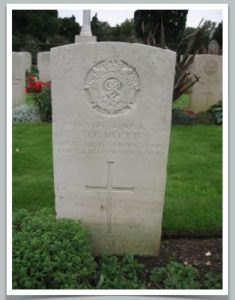Royal Army Service Corps

Daniel Charles Hyett was one of six children (all males) born to Daniel and Florence Sarah Hyett née Dobbing.
He was born at Huntley in the Forest of Dean on 26 July 11896 and at the time of the 1911 Census was living with the rest of his family at 21 Dynever Street, Gloucester.
His father was a saw mill labourer with the Gloucester Wagon Works and Daniel (junior) was an office boy in a solicitor’s office.
Unfortunately, no Army Service Record has survived for Daniel, however, the National Archives does hold his Pension Record and this plus one or two other documents do enable us to build up a reasonable profile of his military service.
He enlisted at Gloucester, for the duration of the war, on 20 April 1915, declaring his age to be 19 (it was actually 18 years and nine months) and his occupation as a clerk.
The only comment regarding his fitness was the need for ‘dental treatment’. The prefix ‘S’ in his army number may indicate service in the supply section of what was then the Army Service Corps.
His initial posting was to Aldershot (presumably for basic training) and he was promoted to Acting Corporal on 17 January 1916.
A further posting followed on 1 April of that year (to 351 Company) and another to 381 Company MT (Motor Transport) at Southampton on 12 August 1916. He reverted to the rank of Private on 2 February 1917 upon joining ‘K’ Company at Bath but was then restored to Acting Corporal at the Reserve Supply Personnel Depot on 13 March 1917.
On 26 March he left Southampton aboard HMT Huntscraft bound for Le Havre and that arrived the following day. He joined the strength of No 30 L & C Supply Company and on 29 October 1917 was in Paris awaiting orders, prior to a posting to the HQ of the British Expeditionary Force (BEF) on 2 February 1918.
In September 1918 his health started to cause concern and very early into 1919 he was admitted to No 62 General Hospital with what was thought was bronchitis. On 5 January 1919 he was invalided back to the UK aboard the Hospital Ship Grantully Castle and was sent to the 2nd Western General Hospital in Manchester. This was a large hospital with many satellite units spread over the city and Daniel Hyett was probably placed at the Stepping Hill unit.
It was still considered that his illness was bronchitis. An Army Medical Board convened on 24 May 1919 reported his condition as pulmonary tuberculosis, which had ‘originated in Italy in September 1918’. The reference to Italy is puzzling as there is no evidence in any records discovered to date that he served anywhere other than the UK or France.
The medical report reads: Patient went sick with cough on 26 November 1918, which had been present since September 1918 … he has been treated by open air in a general hospital since arriving in England (standard treatment for pulmonary TB in pre-antibiotic days). Three months (ago) his throat began to pain him and hoarseness commenced. This has become worse gradually.
Daniel was discharged from the Army as not physically fit for war service on 31 May 1919 and he was awarded a 100% disability pension of 30 shillings (£1.50) per week from 1 June 1919 to be reviewed six months later. He was awarded a Silver War Badge to indicate discharge from military service.
Following discharge, being a sick, single man, he returned to his parents’ home, now at 88 Regent Street, Gloucester, where he died on 4 September 1919, aged 23. A notice of appreciation of messages of sympathy was placed by the family in the Gloucestershire Journal of 13 September.
Corporal Daniel Charles Hyett was buried in the plot reserved for Great War military deaths in Gloucester Old Cemetery, where a standard CWGC headstone marks his grave.
He is also commemorated on the Gloucester War Memorial.
Researched by Graham Adams 23 July 2019
